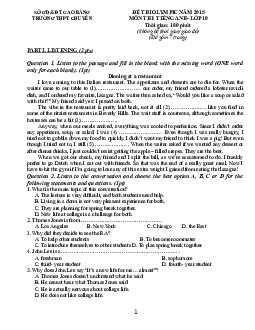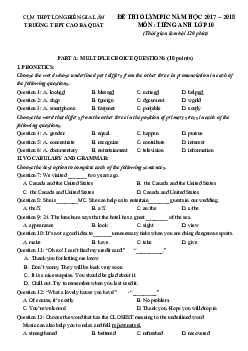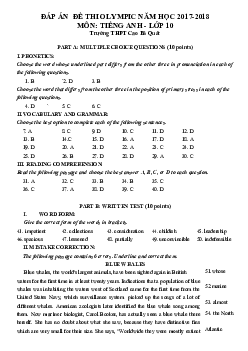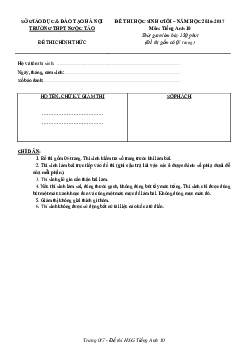





Preview text:
PRACTICE TEST
I. Choose the word whose underlined part is pronounced differently from that of the others. Write
your answers (A or B, C, D) in the numbered spaces. 1. A. invention B. eruption C. suggestion D. motivation 2. A. diaper B. diamond C. diary D. diameter 3. A. foreign B. continent C. scholarship D. almost 4. A. architect B. parachute C. choir D. psychology 5. A. companion B. company C. comparison D. compartment 1: C 2: D 3: D 4: B 5: B
II. Choose the best answer to complete each of the following sentences. Write A, B, C or D in Your answers
6.When I asked what was wrong, _______.
A. I was explained the problem B. he explained me the problem
C. the problem was explained to me D. All are correct 7. He is a_______.
A. capable of taking difficult decisions manager. B. manager capable of taking difficult decisions.
C. capable manager of taking difficult decisions. D. manager capable to take difficult decisions.
8. I saw my former teacher in the street …………day A. another B. the other C. other D. others
9. TV advertising in the late afternoon tends to __________ young children. A. target B. point C. focus D. aim
10. __________ your time. We don’t have to be there until after eight. A. Pass B. Have C. Run D. Take
11. I would have paid _________ for my car if the salesman had insisted because I really liked it. A. twice as much as B. much twice C. twice as much D. two times as much
12. Salt is manufactured in quantities that exceed those of most, _________, other commercial chemicals. A. of all not B. not if all are C. are not all D. if not all
13. _________modern offices becoming more mechanized, designers are attempting to personalize them
with warmer, less severe interiors. A. If B. With C. But Once
14. All _________, there must have been 3000 people in that small hall. A. told B. said C. meant D. found
15. It’s a(n) ________ club to which only members are admitted. A. private B. Personal C. Inclusive D. Exclusive
16. The rather humid climate in no way __________ the natural beauty of this holiday resort.
A. detracted: phẻ bangs, dìm pha B. Attracted C. Subtracted D. Contracted
17. We wanted to offer help, but the ______ glare on his face stopped us. What can we do? A. violent B. passionate C. vigorous D. fierce
18.Did you _____ the Eurovision song contest last night? It was great! A. grab B. hold C. catch D. fetch
19.Prices are now running at a(n) _______ level of thirty percent. A. highest B. record C. uppermost D. top
20. A : “ I can’t believe we’re actually here in the Caribbean !” B: “... ..”
A. This is the life ! B. Life goes on C. But I believe D. Why can’t you ?
21. A : Wasn’t it Mozart who composed “Swan Lake” ? B: “... ..”
A. I haven’t a clue C. It is not my favorite B. Yes, he wasn’t D. It’s out of question
22. It should be the responsibility of children’s TV producers to.........moral values in their viewers. A. Teach
B. Instill: để tâm đến C. Explain D. Put
23. What? Your sister saw Jimmy at the Vinh Theatre ! Well, if it .......... him, he
must have been dismissed again. A. really had been B. were really C. had really been D. was really
24. My grandmother was a lovely person who..................pleasure from helping others. A. Gathered B. Derived C. Deduced D. Collected 6:C 7: B 8: B 9:A 10:D 11:C 12: D 13: B 14: A 15: D 16: A 17: D 18: C 19: B 20: A 21: A 22: B 23: D 24: B
Mark the letter A, B, C, or D on your answer sheet to indicate the word(s) CLOSEST in meaning to the
underlined word(s) in each of the following questions.
Question 19: Cows with newly born calves often show a strong urge to protect their helpless young.
A. desire: khẩn cầu B. reaction C. thought D. decision
Question 20: All visitors are told to watch out for pickpockets in public places. A. take care of B. look for C. pay attention to D. beware of
Mark the letter A, B, C, or D on your answer sheet to indicate the OPPOSITE in meaning to the
underlined word(s) in each of the following questions.
Question 21: Various programs have been designed in order to facilitate the storage and analysis of research data. A. ease B. hinder C. speed D. destroy
Question 22: It seems that the deal was made behind closed doors as no one had any clue about it. A. secretly B. daily C. transparently D. frankly
Mark the letter A, B, C, or D on your answer sheet to indicate the sentence that best completes each of the following exchanges.
Question 23: Mike and Laura are talking about their plan for the weekend.
- Mike: “I promise to go shopping with you if you help me with the housework.”
- Laura: “______ You are the last person to keep a promise.” A. Come off it! B. That’s great! C. How come? D. I hate to differ.
Question 24: Laura and Mitchell are talking about their class monitor, Susie.
- Laura: "You know, Susie’s father is very rich."
- Mitchell: "______ She wouldn’t accept his help even if it were offered." A. What for? B. No wonder. C. So what? D. No doubt. 19: A 20: D 21: B 22: C 23: A 24: C
III. Read the text below. Use the word given in capitals to form a word in the space.
1.Too much of the food we eat nowadays is full of chemicals and other __________. (ADD)
2. All animals, and probably other __________ such as trees, or even the universe itself, must in the nature of things ‘wear out’. (ORGAN)
3.My favourite subject at school was _________ geography. Now I want to study it at university. (DOUBT)
4. He proposes closing down all the __________ factories in the area. (ECONOMY)
5. Managers should be more __________ to the needs of their staff. (RESPOND)
6. She felt __________ by her classmate’s arrogant behaviours. (LITTLE)
7. Let’s join us for a(n) __________ drink at the pub! (CELEBRATE)
8. The winners of the two __________ are to compete for the trophy at the end of the month. (FINAL)
9. You may have some __________ during the first few days but you’ll soon get used to it. (COMFORT)
10. Thanks to the __________ of the soil, there’s plenty of food on the Island. (FERTILE) 1: additives 2: organism 3: undoubtedly 4: uneconomic 5: responsive 6: belittled 7: celebratory 8: semi-finals 9: discomfort 10: fertilization
IV. The passage below contains 10 mistakes. Underline the mistakes and correct them.
Gender selection - the choosing of a baby's gender prior to birth - occurs in many parts of the world.
In China and India, for example, a baby's gender is considered to be of vitally importance to the family,
and male babies are often preferred over females for cultural reasons. In western countries as well, there are
many reasons that a family might want to choose a baby's sex. Often parents wish to have a mix of both
boys and girls in the family. There are also healthy reasons for gender selection: many diseases affect
children only one sex and a family that is susceptible for these diseases may wish to choose a baby's gender
to avoid having an affected child.
This demand for gender choice for parents has led scientists worldwide to investigate gender selection prior
to conception. Conventional wisdom states that the father's sperm is the main determinant of the child's
gender, but recent research has begun to reveal the number of other possible determining factors.
The eating habits of women in rich western countries could explain the slight fall in male births that has
reported over the past several years. In the UK, male births are falling by 1 per 1 ,000 births per year. This
could be ascribed to the decline in the number of adults and adolecent girls eating breakfast in a regular
basis. In addition, the popularity of low-calorie diets for females of child-bearing age could also be a factor
contributing to the reduction on male births. 1: vitally-vital 2: healthy-health 3: for-to (line6) 4: the-a
5: has reported- has been reported 6: in-on 7: on-in 8: that-why
9: adolescent-adolescent 10: In UK- in the uk
V. Read the text below. Use the word given in capitals to form a word in the space. The Power of File Sharing
The big music story of 2005 turned out to be the success of the Arctic Monkeys, a British group
(1) ..................debut single went straight to the top of the charts. But theirs was (2).........................
ordinary success story in the music business. Far (3).........................being discovered and promoted
by one of the big record labels, the grout had made it on their own; recording their own material and freely
distributing it via the Internet. Music fans had downloaded the songs realized (4)................. good they were
and then forwarded the file to their friends by means of what became known as 'file sharing'. In other words,
the group's reputation had been established via word-of-mouth.
The previous decade had seen a real revolution (5)....................... home recording. It had become
possible for anyone with musical talent, and a modest amount to invest in the latest digital equipment, to
achieve home recordings of comparable quality (6)..................... those produced in professional studios.
To people in the music business, (7) ....................., the idea of allowing free downloading was unthinkable.
Surely, they reasoned, if you (8).......................... your music away on the Internet, nobody would buy a
hard copy. But the success of the Arctic Monkeys demonstrated that the loss of potential income when
people downloaded songs (9) ..........................than buying them, could be offset by the increased exposure
the music got as a result. In effect, it was worth making some songs freely available as a way of generating
interest in others for (10)..................... , of course, people had to pay. 1: whose 2: no 3: from 4: how 5: in 6: to 7: however 8:give 9: rather 10: which
VI. Read the following text and then choose from the list A-I given below the best phrase to fill each of
the spaces. Each correct phrase may only be used once. Some of the suggested answers do not fit at all.
The problems of public speaking
For most people, one of the biggest fears in life is having to make a speech, whether at school, at a wedding,
or in our business lives. There are several good reasons for this, not least amongst them the fear that no-one
will have the slightest interest in what you are saying. If you are on stage, as is often the case with such
speeches, there's no problem. (1) ..... you to see the audience, because the Jights blind you the moment you
step up. The only area of the stage that may have no light whatsoever is the lectern where you put your notes
- it will be in total darkness.
(2) ..... you probably realise that you've left your glasses at home. (3) ..... , you now have to
improvise a 40-minute speech based on those few words of your notes you can actually see.
It's then that the technical faults start to come into play. First, if you need any, your slides
and illustrations won't work. (4) ..... , you'll accidentally push the wrong button and show
everything upside down. (5) ..... , they will show the wrong picture at the wrong time, and
even jump a couple. If you're lucky, the lights will fail at this point and the speech will have
to be abandoned! (6) ..... the technical support is excellent, which allows you to make a good
and lasting impression. It's important to start well. To fight nerves, it's a good idea to grip the
lectern with both hands, but not too tightly, because they have been known to collapse! A It's at about this time that F
There are times, however, when B
If professionals are in charge G However, if it isn't the case C It's always a good thing H
Despite having spent ages preparing it D If it's in your hands I With this in mind E
Fortunately, it is not possible for 1:E 2: A 3: H 4: D 5:B 6:F
VII. Read the following passage and choose the best answer.
Choose the correct heading for paragraphs A and C-H from the list of headings below. List of Headings
i Scientists' call for revision of policy
vii The relevance to health
ii An explanation for reduced water use
viii Addressing the concern over increasing
iii How a global challenge was met populations
iv Irrigation systems fall into disuse
ix A surprising downward trend in demand for
v Environmental effects water
vi The financial cost of recent technological
x The need to raise standards improvements
xi A description of ancient water supplies 1. Paragraph A 2. Paragraph C 3. Paragraph D 4. Paragraph E 5. Paragraph F 6. Paragraph G 7. Paragraph H MAKING EVERY DROP COUNT A
The history of human civilization is entwined with the history of ways we have learned to manipulate water
resources. As towns gradually expanded, water was brought from increasingly remote sources, leading to
sophisticated engineering efforts such as dams and aqueducts. At the height of the Roman Empire, nine
major systems, with an innovative layout of pipes and well-built sewers, supplied the occupants of Rome
with as much water per person as is provided in many parts of the industrial world today. B
During the industrial revolution and population explosion of the 19th and 20th centuries, the demand for
water rose dramatically. Unprecedented construction of tens of thousands of monumental engineering
projects designed to control floods, protect clean water supplies, and provide water for irrigation and
hydropower brought great benefits to hundreds of millions of people. Food production has kept pace with
soaring populations mainly because of the expansion of artificial irrigation system that make possible the
growth of 40% of the world's food. Nearly one fifth of all the electricity generated worldwide is produced by turbine spun by the power of falling water. C
Yet there is a dark side to this picture: despite our progress, half of the world's population till suffers, with
water services inferior to those available to the ancient Greeks and Romans. As the United Nations report on
access to water reiterated in November 2001, more than one billion people lack access to clean drinking
water: some two and half billion do not have adequate sanitation services. Preventable water-related diseases
kill an estimated 10,000 to 20,000 children every day, and the latest evidence suggests that we are falling behind in efforts to solve their problems. D
The consequences of our water policies extend beyond jeopardizing human health. Tens of millions of
people have been forced to move from their homes - often with little warning or compensation - to make
way for the reservoirs behind dams. More than 20% of all freshwater fish species are now threatened or
endangered because dams and water withdrawals have destroyed the free-flowing river ecosystems where
they thrive. Certain irrigation practices degrade soil quality and reduce agricultural productivity.
Groundwater aquifers* are being pumped down faster than they are naturally replenished in part of India,
china, the USA and elsewhere. And disputes over shared water resources have led to violence and continue to raise local, national and even international tensions. E
At the outset of the new millennium, however, the way resource planners think about water is beginning to
change. The focus is slowly shifting back to the provision of basic human and environmental needs as top
priority - ensuring 'some for all,' instead of 'more for some'. Some water experts are now demanding that
existing infrastructure be used in smarter ways rather than building new facilities, which is increasingly
considered the option of last, not first, resort. This shift in philosophy has not been universally accepted, and
it comes with strong opposition from some established water organizations. Nevertheless, it may be the only
way to address successfully the pressing problems of providing everyone with clean water to drink, adequate
water to grow food and a life free from preventable water-related illness. F
Fortunately - and unexpectedly - the demand for water is not rising as rapidly as some predicted. As a result,
the pressure to build now water infrastructures has diminished over the past two decades. Although
population, industrial output and economic productivity have continued to soar in developed nations, the rate
at which people withdraw water from aquifers, rivers and lacks has slowed. And in a few parts of the world, demand has actually fallen. G
What explains this remarkable turn of events? Two factors: people have figured out how to use water more
efficiently, and communities are rethinking their priorities for water use. Throughout the first three-quarters
of the 20th century, the quantity of freshwater consumed per person doubled on average; in the USA, water
withdrawals increased tenfold while the population quadrupled. But since 1980, the amount of water
consumed per person has actually decreased, thanks to a range of new technologies that help to conserve
water in homes and industry. In 1965, for instance, Japan used approximately 13 million gallons* of water to
produce $1 million of commercial output; by 1989 this had dropped to 3.5 million gallons (even accounting
for inflation) - almost a quadrupling of water productivity. In the USA, water withdrawals have fallen by more than 20% from their peak in 1980. H
On the other hand, dams, aqueducts and other kinds of infrastructure will still have to be built, particularly in
developing countries where basic human needs have not been met. But such projects must be built to higher
specifications and with more accountability to local people and their environment then in the past. And even
in regions where new projects seem warranted, we must find ways to meet demands with fewer resources,
respecting ecological criteria and to smaller budget. Question 21-26
Do the following statement agree with information given in Reading Passage 65:
YES if the statement agrees with the claims of the writer
NO if the statement contradicts the claims of the writer
NOT GIVEN if it is impossible to say what the writer thinks about this
8. Water use per person is higher in the industrial world than it was in Ancient Rome.
9. Feeding increasing populations is possible due primarily to improved irrigation systems
1o. Modern water systems imitate those of the ancient Greeks and Romans.
11.Industrial growth is increasing the overall demand for water.
12.Modern technologies have led to reduction in the domestic water consumption.
13.In the future, governments should maintain ownership of water infrastructures. 1: xi 2: vii 3: v 4: i 5:ix 6:ii 7: x 8: No 9: Yes 10: not given 11: no 12: yes 13: not given C. WRITING
Rewrite each sentence so that it contains the word in bold, and so that the meaning stays the same.
1.I advise you to book tickets early this year. (had)
You had better book tickets early this year.
2. He was fired because he was late for work too often. (sack)
He got the sack for being late for work too often
3. He got all the benefit he could out of his holiday. (made)
He made the most of his holiday.
4. He tried to attract the waiter's attention without success. (eye)
He tried to catch the waiter’s eyes without success. 5. Mr. John died of old age.
Mr. John’s death was caused by old age
6. They didn’t punish Jane, only give her a warning. Jane got off with a warning
7. The sooner this job is over, the better.
Let’s get this job over as soon as possible 8. They let us go. We were let go
9. The car has leather seats.
The seats of the car are covered with leathe
10. In the event of nuclear weapons being used, we are all doomed.
If it should happen that nuclear weapons are used, we are all doomed.
Document Outline
- MAKING EVERY DROP COUNT




